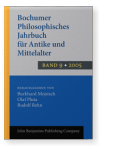What’s in a name? Students of William of Champeaux on the vox significativa
William of Champeaux (1170-1121) is best known as Peter Abelard’s teacher and the proponent of realism of universals. In recent years, many works on the linguistic liberal arts – grammar, dialectic and rhetoric – have been attributed to him. However, at least in the case of the dialectical commentaries, these attributions have been hastily made and are probably incorrect. The commentaries themselves, correctly situated in the time and place when Abelard and William worked at Notre Dame, nonetheless deserve close attention. The commentaries on Aristotle’s De interpretatione are examined here: in them we find a new theory of signification which developed as a critical response to William of Champeaux’s view of the vox significativa, as well as an important clue to the origins of the doctrine of the proprietates terminorum.
Cited by (3)
Cited by three other publications
Cameron, Margaret
2020.
William of Champeaux. In
Encyclopedia of Medieval Philosophy,
► pp. 2062 ff.

Marenbon, John
2008.
Logic at the Turn of the Twelfth Century. In
Mediaeval and Renaissance Logic [
Handbook of the History of Logic, 2],
► pp. 65 ff.

Marenbon, John
2008.
The Latin Tradition of Logic to 1100. In
Mediaeval and Renaissance Logic [
Handbook of the History of Logic, 2],
► pp. 1 ff.

This list is based on CrossRef data as of 1 july 2024. Please note that it may not be complete. Sources presented here have been supplied by the respective publishers.
Any errors therein should be reported to them.
